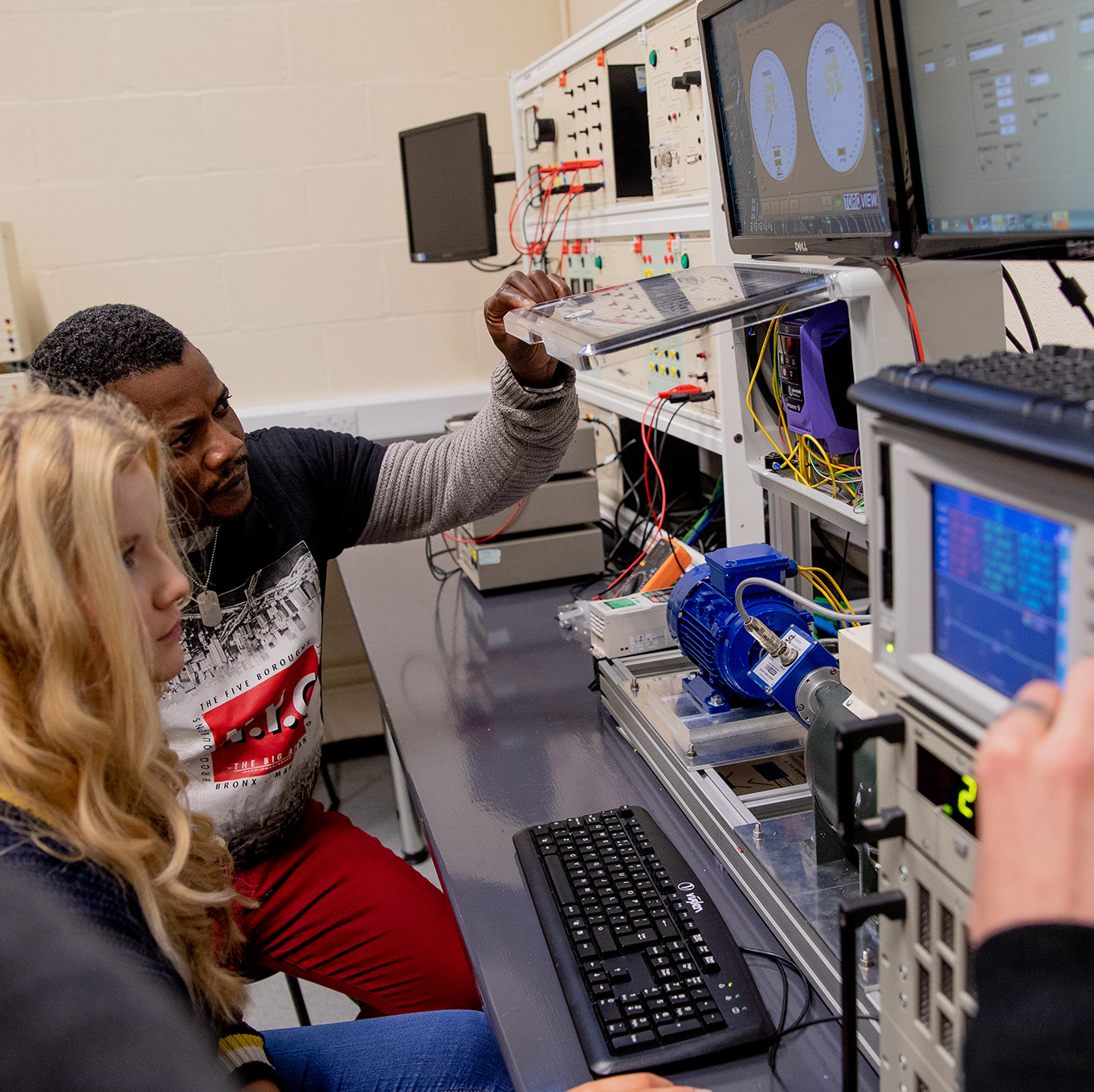BEng (Hons) Manufacturing (Electrical) Degree Apprenticeship

Course details
Year of entry
2026
Duration
3 YRS (FT)
Institution Code
G53
Location
Wrexham
Course Highlights
Combines
academic study with work-based learning
Assessed
through coursework, lab work, and projects instead of formal exams
Earn
a salary while studying
Why choose this course?
The BEng (Hons) Manufacturing Engineering (Electrical) is a three-year Degree Apprenticeship that combines academic study with work-based learning. Fully funded and industry-focused, it develops skilled mechanical engineers ready for technical leadership and innovation in the manufacturing sector.
You will:
- Combine academic learning with practical, work-based training tailored to your employer’s needs
- Earn a salary while studying, with tuition fees fully funded through the Degree Apprenticeship model
- Be assessed through coursework, lab work, and projects instead of formal exams, mirroring industrial practice
- Undertake an Industrial Project aligned to your workplace, applying knowledge directly to business challenges
- Graduate as a highly skilled, work-ready engineer with opportunities for progression into leadership or further study
Key course features
- Gain strong foundations in mechanical and electrical engineering, design, and materials in year one
- Develop applied expertise in Power Distribution, Industrial Automation and PLCs, and Control Diagnostics in year two
- Explore digital transformation and innovation through the Digital Innovation in Engineering module
- Develop organisational awareness and leadership skills with Engineering and Operations Management
- Specialise in advanced topics such as Electrical Modelling and Simulation, Digital Communication, and Predictive Maintenance in year three
- Note: This programme is designed to meet the accreditation requirements of the AHEP-4 Curriculum and will be submitted for consideration by the relevant PSRBs to achieve formal accreditation
What you will study
Year 1 (Level 4)
In year one, you will establish a solid foundation in engineering fundamentals through modules such as Engineering Maths, Mechanical Engineering, and Electrical Engineering. Core skills are further developed in Engineering Design and CAD and Engineering Materials and Processes, with hands-on workshops and practical lab work enhancing technical confidence. The Work Based Learning module ensures that academic knowledge is directly applied within your workplace, reinforcing relevance and real-world learning.
Modules:
- Engineering Maths
- Mechanical Engineering
- Electrical Engineering
- Engineering Design and CAD
- Engineering Materials and Processes
- Work Based Learning
Year 2 (Level 5)
In year two, you will build on this foundation with applied modules such as Power, Distribution and System Design, Industrial Automation and PLCs, and Control System Diagnostics. Innovation and digitalisation are explored through Digital Innovation in Engineering, while Engineering and Operations Management builds awareness of business processes. The Industrial Project runs across the year, allowing you to contribute meaningfully to a workplace challenge or opportunity.
Modules:
- Power, Distribution and System Design
- Digital Innovation in Engineering
- Industrial Automation and PLCs
- Control System Diagnostics
- Engineering and Operations Management
- Industrial Project
Year 3 (Level 6)
In year three, you will explore specialist topics including Electrical Modelling and Simulation, Digital Communication Techniques, and Predictive Maintenance and Safety Systems. Professional development is supported by the Professional Practice module. The year concludes with a substantial individual Project, where you will deliver a workplace-aligned solution that demonstrates their technical capability, critical thinking, and readiness to lead within modern industrial environments.
Modules:
- Electrical Modelling and Simulation
- Digital Communication Techniques
- Predictive Maintenance and Safety Systems
- Professional Practice
- Project
NOTE: Please note that this programme is currently subject to validation. Course content, structure, and module titles may be subject to change prior to final approval.
Entry requirements & applying
The standard entry requirements of the University for this programme are (for Level 4 entry):
- 48 UCAS tariff points from an appropriate Level 3 qualification such as A Levels
- 5 GCSEs at grade A*-C, including Maths and English Language/Welsh
Applicants without the necessary UCAS tariff points, or who have qualifications that do not carry UCAS tariff points, will be considered based on their professional experience within the industry they intend to study the apprenticeship in. All applicants who do not meet the above requirements will be interviewed prior to being made an offer, providing those without formal UCAS tariff points the opportunity to demonstrate how their skills and experiences from within the industry make them a suitable candidate for this programme of study.
Teaching & Assessment
Our teaching approach is designed to be flexible, engaging, and focused on your success. Learning is delivered through Wrexham University’s Active Learning Framework, blending on-campus sessions with online activities to give you the best of both worlds. You’ll develop key employability skills throughout your studies, with teaching that adapts to your needs and prepares you for the demands of your future career.
- Face-to-Face Learning: You will engage in lectures, seminars, and workshops in various settings, incorporating case studies and problem-based learning. In some instances, sessions maybe be recorded for later access via the Virtual Learning Environment (VLE)
- Virtual Learning: Delivered through the VLE and Microsoft Teams, virtual learning includes asynchronous tasks (videos, quizzes, readings, virtual visits) and synchronous activities (discussions, case studies, simulations). Sessions will be recorded where appropriate
- Tutorials: Held both in person and online, individual and group active participation, critical thinking, and student-led learning
- Assessment Strategy: The degree has an innovative assessment strategy with no formal exams, replacing them with coursework, practical work, and project-based assessments that mirror industry practice. This approach, combined with access to modern facilities and strong employer input, ensures graduates are well-prepared for employment or further study in the sector
Teaching and Learning
We offer workshops and support sessions in areas such as academic writing, effective note-making and preparing for assignments.
Students can book appointments with academic skills tutors dedicated to helping deal with the practicalities of university work. Our student support section has more information on the help available.
In terms of particular needs, the University’s Inclusion Services can provide appropriate guidance and support should any students require reasonable adjustments to be made because of a recognised prevailing disability, medical condition, or specific learning difference.
Career prospects
This degree apprenticeship is ideal for individuals employed in the manufacturing sector who want to upskill while working. By combining academic study with direct workplace application, apprentices gain the technical knowledge, problem-solving ability, and professional skills required to advance into senior technical, supervisory, or project management roles, while laying the foundation for Chartered Engineer status or postgraduate study.
Subject to validation
Courses shown as “subject to validation” are new courses which are in development and the details of these courses are in the process of being finalised through the approval cycle, known as the ‘validation’ process. As soon as the programmes are validated the details of the course will be confirmed. The majority of new courses that are still ‘subject to validation’ are approved by the validation process; however, this is not guaranteed and should the course not go ahead as planned, or be significantly amended, you will be informed by the university and assistance will be provided to those who have been offered a place to find a suitable alternative course either at Wrexham University or at another provider.
Apply Now
Individual Applicants
If you're applying for a Degree Apprenticeship as an individual, please complete our online application form.
Employers
If you're an employer looking to reserve a place for a future apprentice or would like more information about the Degree Apprenticeship on behalf of an employee, please contact us at apprenticeships@wrexham.ac.uk.
